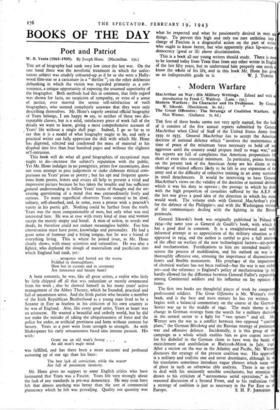Modern Warfare
Modern Warfare : Its Character and Its Problems. By Gene W. Sikorski. (Hutchinson. 8s. 6d.) • The Great Offensive : The Strategy of Coalition Warfare. Max Werner. (Gollancz. 7s. 6d.)
THE first of these books seems not very aptly named, for the bu of it consists of the five annual reports submitted by Gener. MacArthur when Chief of Staff of the United States Army fr. 1939 to 1935. General MacArthur has to accept the Americ doctrine of national defence which " involves the maintenance time of peace of the minimum force necessary to hold off an aggressor until the country could prepare itself to wage war," an his reports are full of complaints that American preparations f short of even this essential minimum. In particular, points beari on the present task of the American Army are his alarm at t shortage of trained officers likely to be felt in any expansion of th army and at the difficulty of collective training in an army scatter in small detachments. It would be interesting to have Gener. MacArthur's views on the validity of the doctrine of national defen which it was his duty to operate ; the passage in which he deal with the high proportion of casualties suffered by the A.E.F. the last war gives a good idea of the direction in which his mi would work. The volume ends with General MacArthur's pla for the defence of the Philippines and with the Washington versio of the communiques dealing with the fighting in the Bataa peninsula.
General Sikorski's book was originally published in Poland 1934—the same year as General de Gaulle's book, with which has a good deal in common. It is a straightforward and we informed attempt at an appreciation of the military situation as appeared in 1934, and the author is careful to give a full analys of the effect on warfare of the new technological factors—air-pow and mechanisation. Fortifications to him are intended mainly screen the process of mobilisation, and his outlook on war is thoroughly offensive one, stressing the importance of discontinuo fronts and flexible manoeuvre. His proplutcy of the importan of chemical warfare has not been realised—but the war is not end yet—and the reference :o England's policy of mechanisation (p. 85) hardly allowed for the difference between General Fuller's reputat. among Continental soldiers and his influence on lay opinion at home.
The first two books are thoughtful pieces of work by competen professional soldiers. The Grea- Offensive is Mr. Werner's thir book, and is the best and most mature he has yet written. begins with a balanced commentary on the course of the Germ• Soviet war up to the middle of 1942. The main theme is change in German strategy from the search for a military decisia in the central sector to a fight for " vast spaces " and oil. Mr Werner sees the wat as a conflict between two opposed " comb plans," the GermadBlitzkrieg and the Russian strategy of prolong war and offensive defence. Incidentally, it is this grasp of th campaign as a whole which enables him to give cogent reasons for his disbelief in the German claim to have won the battle of encirclement and annihilation at Bialystok-Minsk in July, 1941 After a section on the war in the Atlantic and Pacific, Mr. Wern-, discusses the strategy of the present coalition war. His approa is a military and realistic one and never doctrinaire, although he his translators sometimes introduce vague phrases which seem o of place in such an otherwise able analysis. There is no spa to deal with his eminently sensible conclusions, but attention drawn to his criticism of " autonomous aerial operations," to h reasoned discussion of a Second Front, and to his realisation th a strategy of coalition is just as necessary in the Far East as ie


























 Previous page
Previous page